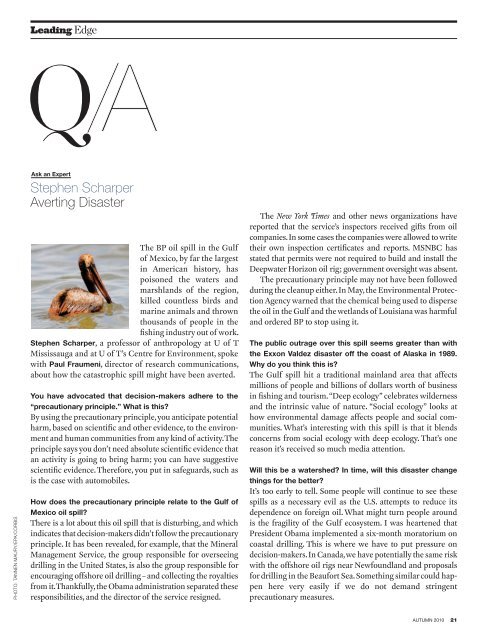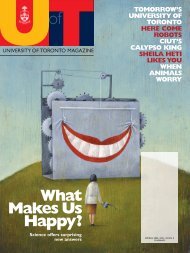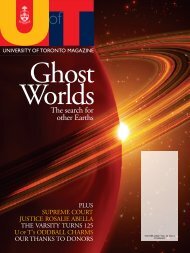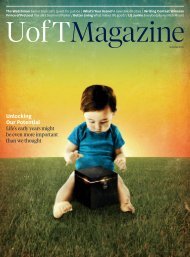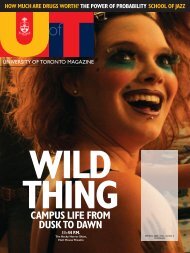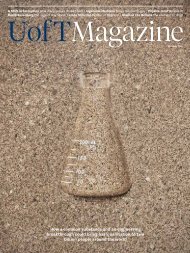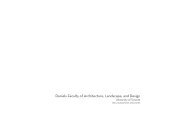Leading EdgePrototypeAll Clear Surveillance and surgerycould both get a boost from a new kind<strong>of</strong> video camera that can focus on nearand distant objects at the same timeSometimes, you want to see both the forestand the trees. With video recording,though, you’ve had to settle for one orthe other. Now an innovative newvideo camera promises to bring bothsimultaneously into focus.The Omni-focus video camera isthe brainchild <strong>of</strong> Keigo Iizuka, a pr<strong>of</strong>essoremeritus in the Edward S.Rogers Sr. department <strong>of</strong> electrical andcomputer engineering. The camera canfocus on objects both near and far withhigh resolution, automatically and inreal time, says Iizuka. He and his private-sectorcollaborator David Wilkes believe the device may find use not onlyin movie-making, but also in areas such as security and medicine.The key breakthrough is a special infrared camera that can map out theexact distance from the camera to each object in a scene. It works by illuminatingtwo separated infrared LEDs in succession, snapping an infrared photowith each illumination and then comparing the images. One LED is locatedjust in front <strong>of</strong> the infrared camera and one just behind it. Because the lightis travelling slightly farther from the back LED, the two images <strong>of</strong> the samescene are different. That difference is used to calculate how far away theobjects are.Also within the Omni-focus camera are standard, colour video cameras,one per desired focal point, each camera focused on a different depth <strong>of</strong> thescene. The current prototype, about the size <strong>of</strong> a shoebox, has two videocameras, but it could contain more, says Iizuka. Due to an arrangement <strong>of</strong>prisms and mirrors, all the cameras are viewing the scene from the samevantage point. Special s<strong>of</strong>tware, designed by Wilkes, uses distance informationfrom the infrared camera to select the best individual pixels from the videocameras to form a unified and focused image. Iizuka has a video, for instance,that shows both the eye <strong>of</strong> a needle just centimetres from the camera and theeye <strong>of</strong> a needle a little more than a metre away, both in clear focus.The first bite <strong>of</strong> commercial interest in the Omni-focus video camera hascome from a maker <strong>of</strong> laparoscopes in the U.S. A laparoscope is a slender tubefitted with a camera that’s fed through a tiny incision in the abdomen, andused to view parts <strong>of</strong> the abdominal cavity up close. Conventional laparoscopeshave trouble viewing the whole terrain <strong>of</strong> our innards at once; the Omni-focusvideo camera, scaled down, might provide the solution. – Alison MotlukFindingsIdentifyingCancerResearchers at U <strong>of</strong> Tand Mount Sinai Hospitalhave discovered a newway to identify aggressivethyroid cancer and predictpatient outcomes.“Our study shows, for thefirst time, a key biomarker that can be usedin diagnostic, prognostic and therapeuticstrategies for the future management <strong>of</strong>thyroid cancer,” says Paul Walfish, anendocrinologist and pr<strong>of</strong>essor emeritus atthe Faculty <strong>of</strong> Medicine and the seniorauthor <strong>of</strong> the study.Walfish’s team discovered that increasedlevels <strong>of</strong> a biomarker named Ep-ICD withincells can be used to diagnose an aggressiveform <strong>of</strong> thyroid cancer associated with apoor prognosis. “In patients with the mostlethal form <strong>of</strong> thyroid cancer, the levels <strong>of</strong>Ep-ICD were remarkably higher than thosewith a more low-grade papillary thyroidcancer,” said Walfish.Thyroid cancer is the most rapidlyincreasing cancer in Canada, with morethan 3,000 Canadians − 80 per cent <strong>of</strong>them women − diagnosed annually.The research was published at the end <strong>of</strong>June in the medical journal BMC Cancer.– Karin Fleming$ImprovingAccessibilityImproving accessibilityand inclusivity, asrequired by provincial lawunder the Accessibility forOntarians with DisabilitiesAct, could increase thesize <strong>of</strong> the provincialeconomy by almost $5 billion, accordingto a new study from the Rotman School<strong>of</strong> Management.Disabled people view the legislation,passed in 2005, as helping to create a levelplaying field for all Ontarians. But manybusinesses and municipalities acrossthe province responded with skepticism,believing the act would result in increasedcosts and result in few benefits.However, the study finds that the actwill generate both economic opportunityand benefits. For example, the participationrate <strong>of</strong> individuals with a disability couldincrease by two to 15 per cent, thanks toimprovements in accessibility. The reportalso finds that the increased productivitycould increase the province’s per capitaGDP by anywhere from $49 to $653 as aresult <strong>of</strong> the changes, to a total <strong>of</strong> almost$5 billion. – Ken McGuffinPHOTO: james berger20 WWW.MAGAZINE.UTORONTO.CA
Leading EdgeQphoto: TANNEN maURY/epa/CorbisAsk an ExpertStephen ScharperAverting DisasterThe BP oil spill in the Gulf<strong>of</strong> Mexico, by far the largestin American history, haspoisoned the waters andmarshlands <strong>of</strong> the region,killed countless birds andmarine animals and thrownthousands <strong>of</strong> people in thefishing industry out <strong>of</strong> work.Stephen Scharper, a pr<strong>of</strong>essor <strong>of</strong> anthropology at U <strong>of</strong> TMississauga and at U <strong>of</strong> T’s Centre for Environment, spokewith Paul Fraumeni, director <strong>of</strong> research communications,about how the catastrophic spill might have been averted.You have advocated that decision-makers adhere to the“precautionary principle.” What is this?By using the precautionary principle, you anticipate potentialharm, based on scientific and other evidence, to the environmentand human communities from any kind <strong>of</strong> activity. Theprinciple says you don’t need absolute scientific evidence thatan activity is going to bring harm; you can have suggestivescientific evidence. Therefore, you put in safeguards, such asis the case with automobiles.How does the precautionary principle relate to the Gulf <strong>of</strong>Mexico oil spill?There is a lot about this oil spill that is disturbing, and whichindicates that decision-makers didn’t follow the precautionaryprinciple. It has been revealed, for example, that the MineralManagement Service, the group responsible for overseeingdrilling in the United States, is also the group responsible forencouraging <strong>of</strong>fshore oil drilling – and collecting the royaltiesfrom it. Thankfully, the Obama administration separated theseresponsibilities, and the director <strong>of</strong> the service resigned.The New York Times and other news organizations havereported that the service’s inspectors received gifts from oilcompanies. In some cases the companies were allowed to writetheir own inspection certificates and reports. MSNBC hasstated that permits were not required to build and install theDeepwater Horizon oil rig; government oversight was absent.The precautionary principle may not have been followedduring the cleanup either. In May, the Environmental ProtectionAgency warned that the chemical being used to dispersethe oil in the Gulf and the wetlands <strong>of</strong> Louisiana was harmfuland ordered BP to stop using it.The public outrage over this spill seems greater than withthe Exxon Valdez disaster <strong>of</strong>f the coast <strong>of</strong> Alaska in 1989.Why do you think this is?The Gulf spill hit a traditional mainland area that affectsmillions <strong>of</strong> people and billions <strong>of</strong> dollars worth <strong>of</strong> businessin fishing and tourism. “Deep ecology” celebrates wildernessand the intrinsic value <strong>of</strong> nature. “Social ecology” looks athow environmental damage affects people and social communities.What’s interesting with this spill is that it blendsconcerns from social ecology with deep ecology. That’s onereason it’s received so much media attention.Will this be a watershed? In time, will this disaster changethings for the better?It’s too early to tell. Some people will continue to see thesespills as a necessary evil as the U.S. attempts to reduce itsdependence on foreign oil. What might turn people aroundis the fragility <strong>of</strong> the Gulf ecosystem. I was heartened thatPresident Obama implemented a six-month moratorium oncoastal drilling. This is where we have to put pressure ondecision-makers. In Canada, we have potentially the same riskwith the <strong>of</strong>fshore oil rigs near Newfoundland and proposalsfor drilling in the Beaufort Sea. Something similar could happenhere very easily if we do not demand stringentprecautionary measures.autumn 2010 21


